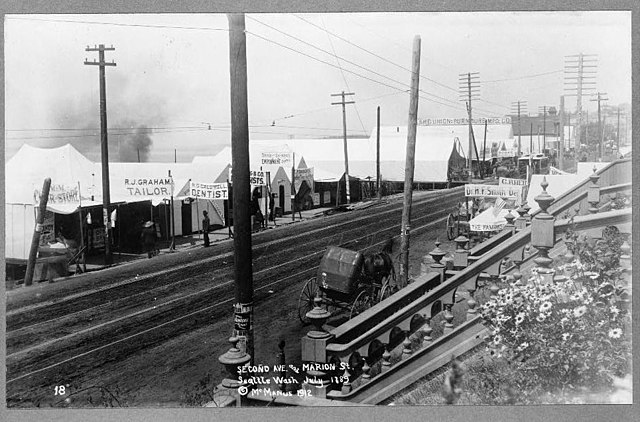History of Seattle before 1900
Two conflicting perspectives exist for the early history of Seattle. There is the "establishment" view, which favors the centrality of the Denny Party, and Henry Yesler. A second, less didactic view, advanced particularly by historian Bill Speidel and others such as Murray Morgan, sees David Swinson "Doc" Maynard as a key figure, perhaps the key figure. In the late nineteenth century, when Seattle had become a thriving town, several members of the Denny Party still survived; they and many of their descendants were in local positions of power and influence. Maynard was about ten years older and died relatively young, so he was not around to make his own case. The Denny Party were generally conservative Methodists, teetotalers, Whigs and Republicans, while Maynard was a drinker and a Democrat. He felt that well-run prostitution could be a healthy part of a city's economy. He was also on friendly terms with the region's Native Americans, while many of the Denny Party were not. Thus Maynard was not on the best of terms with what became the Seattle Establishment, especially after the Puget Sound War. He was nearly written out of the city's history until Morgan's 1951 book Skid Road and Speidel's research in the 1960s and 1970s.

Top: View looking west to Yesler's Mill at the end of the street (see smokestack) and nearby cookhouse; the tall pole in the road on the right is where the Pioneer Square pergola stands today, (1874) Bottom: Yesler's Mill, stores, and taverns on Skid Road (Mill Street, now Yesler Way)
Seattle, engraving from "Harper's New Monthly Magazine" (September 1870).
Second Ave. and Marion St., Seattle, Wash., July 1889
Seattle, looking south from Pine Street, 1880.
David Swinson "Doc" Maynard was an American pioneer, medical doctor, and businessman. He was one of Seattle's primary founders. He was an effective civic booster and, compared to other white settlers, a relative advocate of Native American rights. His friendship with Chief Seattle was important in the formation of the city of Seattle, and it was he who proposed the city be named for this important chief. Maynard was Seattle's first doctor, merchant prince, second lawyer, Sub-Indian Agent, Justice of the Peace, and architect of the Point Elliott Treaty of 1855.
Doc Maynard, circa 1868
Maynard's house in West Seattle.






